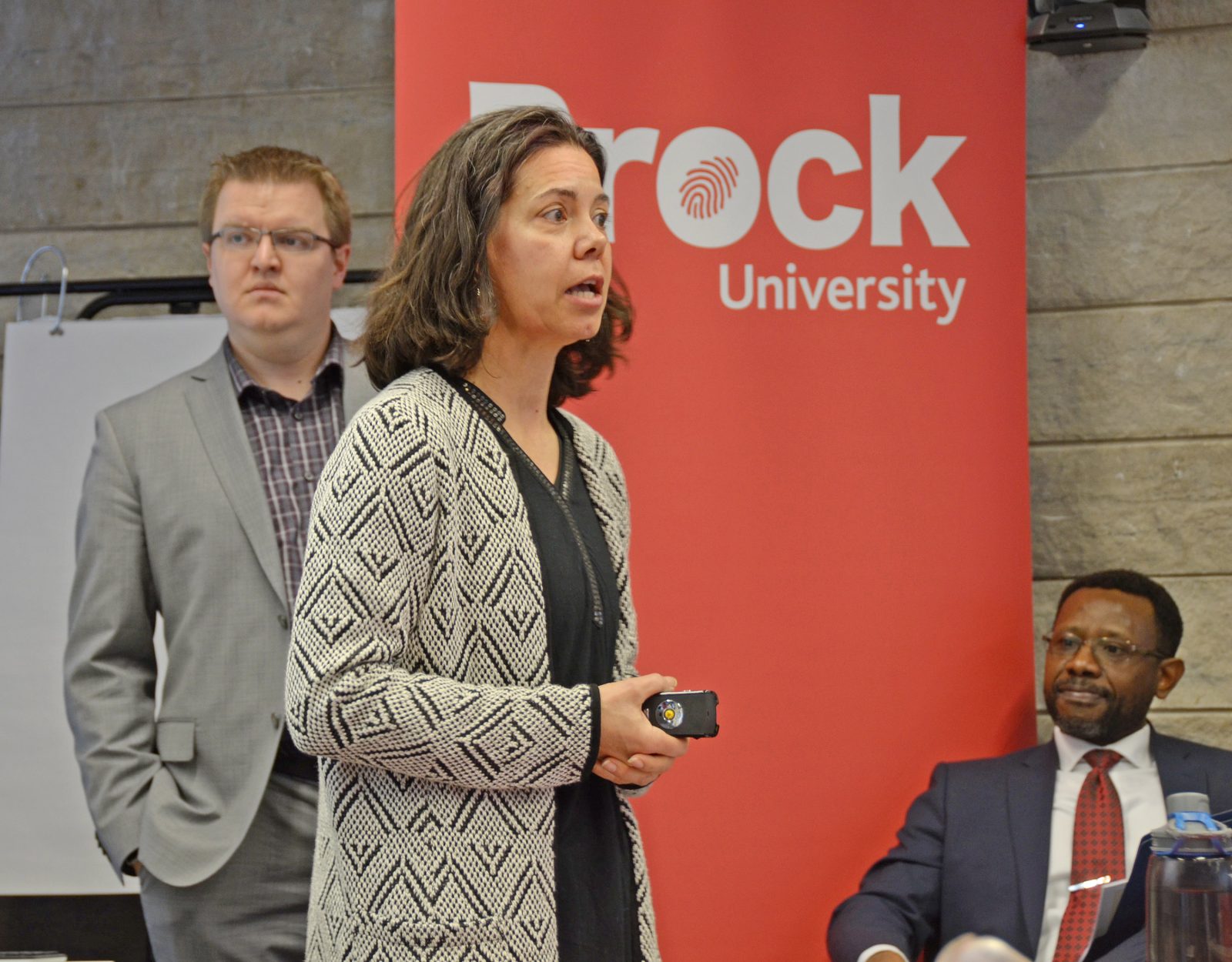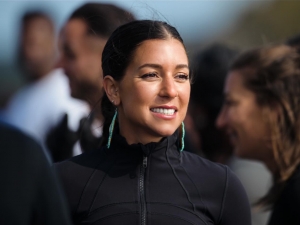 Sport Management master’s student Chris Charlebois, left, and Niagara Community Observatory Director Charles Conteh, right, look on as Julie Stevens, Associate Professor of Sport Management at Brock delivers an address about a new policy brief on measuring sporting event impacts.
Sport Management master’s student Chris Charlebois, left, and Niagara Community Observatory Director Charles Conteh, right, look on as Julie Stevens, Associate Professor of Sport Management at Brock delivers an address about a new policy brief on measuring sporting event impacts.The Jerry McGuire-inspired phrase “show me the money” may have been a hit on the big screen, but determining if and how sporting events benefit communities in real life goes beyond calculating the financial bottom line.
New Brock University research says communities’ perceptions of the ways these events impact their social life and physical environment give policy makers and organizers a more complete picture of whether or not to host them.
“While economic-impact studies can be considered a valuable tool for evaluating the overall potential of an event, it should not be a leading determinant in the overall decision-making process,” says the latest policy brief by the Niagara Community Observatory (NCO), which was released Wednesday, Feb. 7.
“With a trend towards ensuring positive social impacts in a community and limited negative environmental impacts, it is increasingly important that those responsible for deciding on event support add more evaluation tools to their ‘toolbox,’” according to the brief, produced by Brock’s Centre for Sport Capacity.
The brief presented a case study of the 2017 Scotties Tournament of Hearts, the national women’s curling championship held in February 2017 at the Meridian Centre in downtown St. Catharines.
Sport Management master’s student Chris Charlebois collected data from surveys that asked attendees to agree or disagree with 22 positive and 18 negative statements about the tournament’s economic, social and environmental impacts.
Examples of statements included:
- increased community development investments
- improved image of St. Catharines
- increased hardship for finding parking
- increased the amount of litter and waste
Charlebois and co-author Julie Stevens, Associate Professor of Sport Management and Director of the Centre for Sport Capacity, calculated the results of the 251 completed surveys.
They found social factors were highest for perceived positive impact.
“Perceptions are important for politicians and other decision makers,” says the policy brief, titled “More than Money: Leveraging the Benefits of Sport Hosting in Niagara.”
“Local residents who believe an event will boost the image of their city provide more cultural opportunities, increase interaction among citizens, or promote healthier living will often be more inclined to support investments into the attraction of sport events.”
Stevens says it’s important to factor in what she calls the “people legacy” of an event.
“When you have individuals engaged in your community through a sporting event, there is a tendency for people to feel more satisfied with their everyday living in a region and to be more willing to engage again in the future, especially when that experience makes them feel included and part of the community,” she says.
Although major events such as the Scotties Tournament of Hearts receive a lot of attention, Stevens says the “bread and butter for the Niagara region when it comes to sport tourism is everyday community sport club or association tournaments that are hosted every week of the year.”
“It’s those clubs and associations that are primarily run by volunteers that truly need the support and the help. An event-hosting strategy needs to target them just as much as the big events,” she says.
The report recommends a regional group be formed to develop a sport-hosting strategy that spans the region’s 12 municipalities, and that those involved in sport tourism “collectively define and effectively track sport event outcomes.”
The brief also summarizes the economic impact of local, national and international sport events on the Niagara economy.
“This brief is a conversation starter,” says NCO Director Charles Conteh. “It’s about re-thinking our measurement of the impact of sport. It’s a paradigm shift; we’re going to challenge and shift how we understand, appreciate, measure and evaluate the impact of sport in our community.”
Wednesday’s launch of the policy brief comes at a pivotal time, with Niagara region set to host the 2021 Canada Summer Games. In Canada, sport tourism is said to be the fastest-growing segment of the tourism industry.









